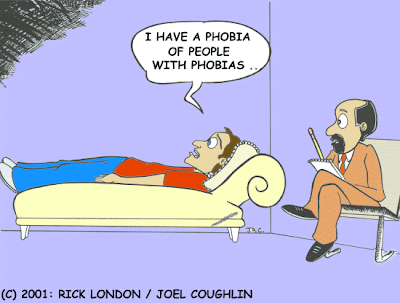Sometimes, to make a point you just have to lecture. This is one of those times. I don’t think most of my regular readers need the lecture, but you might like to point it out to those who do.
Start of lecture:
Do you know what the word “phobia” means? Merriam-Webster gives a single definition: “an exaggerated usually inexplicable and illogical fear of a particular object, class of objects, or situation.”
The central word is “fear,” which is what “phobia” means in Greek. It’s generally a reaction someone has no immediate control over, though it’s possible to reduce it with long-term measures. Examples are acrophobia (fear of heights), claustrophobia (fear of enclosed places), and agoraphobia (fear of crowds). They don’t normally entail hostility, just a strong desire to avoid whatever it is.
 It’s politically fashionable to refer to certain ideas and attitudes as phobias. We have “homophobia,” “Islamophobia,” and “transphobia.” If you use those terms, you’re engaging in amateur psychological diagnosis. it’s trendy to diagnose rather than argue, and claiming someone has a psychological problem saves you from having to challenge them on an intellectual level.
It’s politically fashionable to refer to certain ideas and attitudes as phobias. We have “homophobia,” “Islamophobia,” and “transphobia.” If you use those terms, you’re engaging in amateur psychological diagnosis. it’s trendy to diagnose rather than argue, and claiming someone has a psychological problem saves you from having to challenge them on an intellectual level.
I don’t have any professional credentials in psychology, but I know the difference between a pathological fear and a bad idea.
The trend may have started with the word “xenophobia,” which has been around for a long time. Some people may be genuinely xenophobic, i.e., afraid of anything that seems foreign. I’m not sure whether it fits the clinical definition. Do people have panic attacks when they meet someone from another country or face the prospect of foreign travel? Probably some do. However, the term is frequently used in ways that don’t fit the category. A search on the term turns up pictures of signs reading “Down with xenophobia” and “Say no to xenophobia,” as if involuntary fear could be cured by denouncing it.
“Xenophobia” may have led to the ugly coinage “homophobia.” As a Greek-derived term, it would mean “fear of sameness.” Mix Latin and Greek, and you get “fear of men.” It’s a bad mashing together of roots, but let’s stipulate it means “fear of homosexuals” or “fear of homosexuality.” If you use that term to criticize bigotry, you’re ducking the issue in favor of armchair diagnosis. Instead of saying, “You’re treating gays unjustly, in a bigoted way,” you’re saying “Yer skeered!” It’s easier to claim the other person is driven by an involuntary emotion than to grapple with and challenge their ideas. They might argue back that they’re not bigoted, but if they’ve got a “phobia,” you’re claiming they just can’t help it.
With “Islamophobia,” it gets even worse. When you use the term, you’re saying that hostility toward Muslims is really fear of their religion. Phobic people don’t normally attack the object of their fear. They flee from it. The kinds of spiders we see in the United States are tiny things, easily killed, yet arachnophobes flee from spiders rather than stomping on them or drawing pictures of them.
Then there’s “Islamophobia” to dismiss criticism of a religion based on its history and writings. Criticizing a body of ideas is neither inherently bigoted nor phobic. Dismissing analysis as a phobic response is an admission of intellectual bankruptcy.
People who despise and try to harm Muslims are usually motivated by a belief that the religion’s followers are bad, dangerous, wrong-thinking people, not by an involuntary fright reaction. Don’t call the people who do that phobic. Call them ignorant, bigoted, or wrong if you think they are. If you’re addressing a policy such as a ban on travel from Muslim countries, call it a harmful policy, not a psychological condition.
If you’re dealing with someone who does have a phobia, righteously denouncing it is stupid. The fear which such people fear is partly fear of how they’ll react in triggering situations. Condemning them for their phobias will only increase the stress they feel and increase the chance of a panic attack. Sure, it may make you feel good to talk down to someone. That’s not an excuse.
Tossing around “phobia” words to denounce ideas and actions mocks those who have actual phobias. The more people hear and use the word “phobia” as an insult, the less sympathetic they’ll be to someone who’s dealing with one. Using psychological pseudo-diagnoses to criticize people’s ideas and actions is a cheap stunt. If you think something is wrong, have to courage to say so and the analytic skill to say why.
You can make the discourse better. Challenge wrongs. Shake up complacency. Dissect bad excuses. You can do all that without being a jerk.
End of lecture.